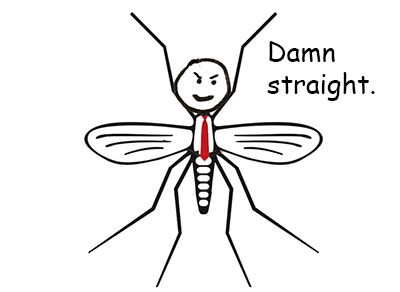
The English language is full of words that seem to perform the same function but have true differences when you need to be specific. In technical, instructive, and other forms of business or formal writing, “if” and “whether” serve different functions.
Now, both words are used to indicate the subjunctive case, which means they can herald a wish or a hypothetical. Basically, the subjunctive case looks like this:
 I wish I were a little mosquito.
I wish I were a little mosquito.
She treated me as if I were a little mosquito.
I deserved respect whether I were a little mosquito or not.
But knowing they can both bring on the subjunctive isn’t enough to determine which of the following is correct:
(a) Whether we used a bootstrapping analysis, we could see the final results.
(b) If we used a bootstrapping analysis, we could see the final results.
(a) There were only two options, so I asked my friends if we were going to order pizzas or hamburgers.
(b) There were only two options, so I asked my friends whether we were going to order pizzas or hamburgers.
Get a free sample proofread and edit for your document.
Two professional proofreaders will proofread and edit your document.
The answer both times is “b.”
Sometimes It Doesn’t Matter
Let’s get one thing out of the way: there are many instances when it’s fine to use either “if” or “whether.”
(a) I don’t know if Margarete is a fan of jazz.
(b) I don’t know whether Margarete is a fan of jazz.
(a) The circus won’t take you with them even if you can juggle.
(b) The circus won’t take you with them whether or not you can juggle.
But sometimes it does matter.
Conditional vs. Optional
When I want to say something is conditional, or that it depends on something else, then I must use “if.”
When I want to discuss the options (or lack of options), then I must use “whether.”
Thus, the following two sentences mean different things:
(a) If Hurricane Georges makes landfall Friday or Saturday, there’s bound to be a lot of rain in our area.
(b) Whether Hurricane Georges makes landfall Friday or Saturday, there’s bound to be a lot of rain in our area.
Sentence A means that there will be rain if Georges lands on Friday or Saturday, but there might be no rain in our area if Georges lands on Sunday instead.
Sentence B means that Georges is expected to land on either Friday or Saturday, but regardless, there will be rain in our area.
Put another way:
(a) If you do this, that will happen.
(b) Whether you do this or not, that will happen.
This rule is actually pretty easy to remember if you bear in mind that “if” is for wishing and “whether” (in this context) always means “whether or not.”
Before Infinitives
Infinitives, such as “to run,” “to talk,” and “to order,” are preceded by “whether,” not “if.”
(a) I haven’t decided whether to go.
(b) She thought about whether to speak about social injustice.
(c) The jury questioned whether to find the defendant guilty.
After Prepositions
(a) The fireman asked about whether the flames started in the kitchen.
(b) The waiter was interested in whether we wanted drinks.
(c) The jury deliberated on whether the defendant were guilty.
Common prepositions:

Want more prepositions, fellow word nerd? Here.
So, while in casual conversation you can pretty much get away with “if” or “whether” as you please, your language can be much more specific (and sound a lot better) if you know the difference. And isn’t that what this is all about?
Julia H.
Get a free sample proofread and edit for your document.
Two professional proofreaders will proofread and edit your document.
Get a free sample proofread and edit for your document.
Two professional proofreaders will proofread and edit your document.
We will get your free sample back in three to six hours!